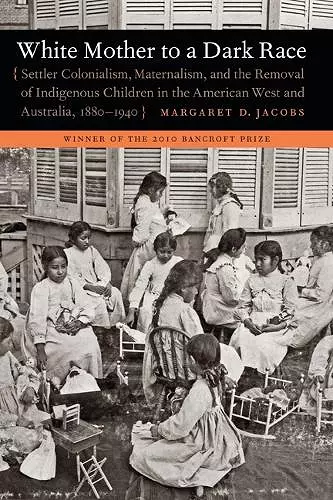White Mother to a Dark Race
Settler Colonialism, Maternalism, and the Removal of Indigenous Children in the American West and Australia, 1880-1940
Format:Paperback
Publisher:University of Nebraska Press
Published:1st Mar '11
Currently unavailable, and unfortunately no date known when it will be back

Examines the roles of white women in Australia's and the United States' policies of indigenous child-removal and education.
In the late nineteenth and early twentieth centuries, American Indians in the United States and Aboriginal people in Australia suffered a common experience at the hands of state authorities: the removal of their children to institutions in the name of assimilation. White Mother to a Dark Race examines the key roles white women played in these removal policies.In the late nineteenth and early twentieth centuries, American Indians in the United States and Aboriginal people in Australia suffered a common experience at the hands of state authorities: the removal of their children to institutions in the name of assimilation. Although officially characterized as benevolent, these policies often inflicted great trauma on indigenous families and ultimately served the settler nations’ larger goals of consolidating control over indigenous peoples and their lands.
White Mother to a Dark Race examines the key roles white women played in these removal policies. Government officials, missionaries, and reformers justified the removal of indigenous children in particularly gendered ways by focusing on the supposed deficiencies of indigenous mothers, the alleged barbarity of indigenous men, and the lack of a patriarchal nuclear family in indigenous societies. Often they deemed white women the most appropriate agents to carry out child-removal policies. Inspired by the maternalist movements of the era, many white women were eager to serve as surrogate mothers to indigenous children and maneuvered to influence public policy affecting indigenous people. Although some white women developed caring relationships with indigenous children and others became critical of government policies, many became ensnared in this insidious colonial policy.
"This book deserves wide readership in U.S. western history, women's history, Indian history, and comparative ethnic studies."—Peggy Pascoe, Montana, the Magazine of Western History
"[Jacobs] has taken the study of these nineteenth and early twentieth century institutionalizing policies in a rewarding new direction. . . . I highly recommend this book to anyone who is interested in indigenous studies, women's studies, and the history of intercultural relations in colonizing situations like the American West."—Nancy J. Parezo, Journal of Arizona History
"Jacobs' focus on the role of white women, and specifically the function of maternalism, generates important insights into the interrelationship between race and gender in the creation of the modern white nation. Attention to the specificities of colonial regimes in the different locations of Australia and the American West—revealing the uncanny similarities as well as significant differences—can only enhance our critical understanding."—Trish Luker, International Journal of Critical Indigenous Studies
"[Margaret D. Jacobs] has produced a balanced, meticulously researched book filled with heartbreaking stories of loss and uplifting accounts of survival."—Lynette Russell, Great Plains Quarterly
"This study stands as an excellent model and should encourage further comparisons between federal Indian policy and other maternalist projects within the United States as well as intimate strategies in other colonial regimes."—Cathleen D. Cahill, Western Historical Quarterly
"[White Mother to a Dark Race is] a monumental comparative study."—Cristina Stanciu, SAIL
ISBN: 9780803235168
Dimensions: unknown
Weight: unknown
592 pages